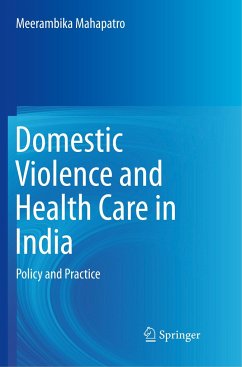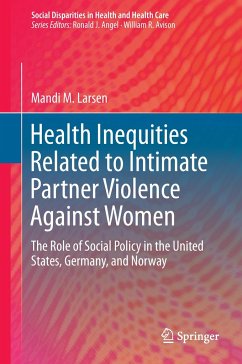
Understanding Gender-Based Violence
An Essential Textbook for Nurses, Healthcare Professionals and Social Workers
Herausgegeben: Bradbury-Jones, Caroline; Isham, Louise

PAYBACK Punkte
23 °P sammeln!
This edited book brings together the voices and insights of survivors, practitioners, educators and researchers working to prevent and minimise the harms of gender-based violence, with a specific focus on equipping health professionals and social workers to support victim-survivors. Practitioners can, and often do, play a critical role supporting victim-survivors of gender-based violence; however, this work has historically been carried out by those in specialist roles and there remains gaps and inconsistencies in education and training for qualifying and post-qualified professionals.This book...
This edited book brings together the voices and insights of survivors, practitioners, educators and researchers working to prevent and minimise the harms of gender-based violence, with a specific focus on equipping health professionals and social workers to support victim-survivors. Practitioners can, and often do, play a critical role supporting victim-survivors of gender-based violence; however, this work has historically been carried out by those in specialist roles and there remains gaps and inconsistencies in education and training for qualifying and post-qualified professionals.
This book makes a valuable contribution to addressing these gaps. It provides practitioners with a comprehensive resource on contemporary debates and research in the field of gender-based violence. To support readers' learning, each chapter contains reflective exercises and draws clear links between research, theory and practice.
The book is structured into four sections. The first section considers the 'rise' of gender-based violence in policy and practice, and questions to what extent this once marginalised perspective has become embedded in health and social work training and education. The second section of the book explores some of the expressions, contexts and implications of gender-based violence. Each chapter considers the role of health care professionals and social workers and invites the reader to reflect on their (potential) role in these areas. The third section of the collection focuses on one of the most common forms of gender-based violence that health and social work professionals are likely to encounter: physical, psychological, sexual and financial violence by an intimate partner, who may also be a parent. Finally, the fourth section showcases innovative responses to supporting victim-survivors and challenging systems that contribute to gender inequality.
The intention of this book is to equip health care professionals and socialworkerswith critical, practical and ethical resources to help them work with victim-survivors and, where possible, engage in transformative efforts to end the harms of gendered inequalities and violence.
This book makes a valuable contribution to addressing these gaps. It provides practitioners with a comprehensive resource on contemporary debates and research in the field of gender-based violence. To support readers' learning, each chapter contains reflective exercises and draws clear links between research, theory and practice.
The book is structured into four sections. The first section considers the 'rise' of gender-based violence in policy and practice, and questions to what extent this once marginalised perspective has become embedded in health and social work training and education. The second section of the book explores some of the expressions, contexts and implications of gender-based violence. Each chapter considers the role of health care professionals and social workers and invites the reader to reflect on their (potential) role in these areas. The third section of the collection focuses on one of the most common forms of gender-based violence that health and social work professionals are likely to encounter: physical, psychological, sexual and financial violence by an intimate partner, who may also be a parent. Finally, the fourth section showcases innovative responses to supporting victim-survivors and challenging systems that contribute to gender inequality.
The intention of this book is to equip health care professionals and socialworkerswith critical, practical and ethical resources to help them work with victim-survivors and, where possible, engage in transformative efforts to end the harms of gendered inequalities and violence.












